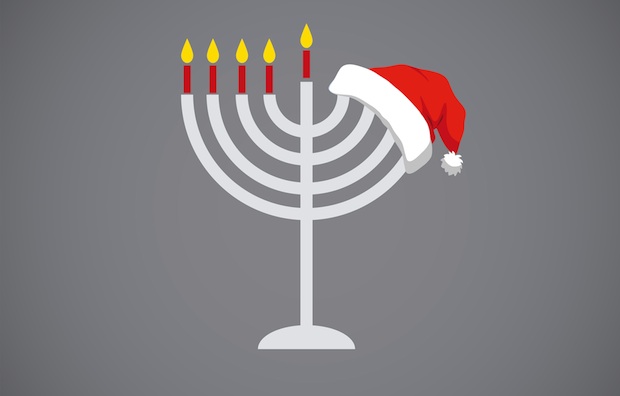Hanukkah 2014 begins tonight, December 15, at sundown. That date corresponds to the 25th of the Hebrew month of Kislev, for you Jewish calendar buffs. And why does the holiday begin at Sundown, not midnight, as all days on the secular calendar? Because according to Jewish tradition, every day begins at sundown.
Think of this as both a tribute to how time is counted in the Genesis creation story – “And it was evening and it was morning…” – and also as a way to let people know that even though most folks see the sun set and think of what is ending, Jewish tradition reminds us that as much as something is ending, a new day is actually beginning. It’s about celebrating possibilities even when others may not see them. That capacity is central to the Hanukkah story.
The story of Hanukkah, celebrates the victory of a small Jewish army in the Land of Israel, fighting for a combination of religious, cultural and political liberty between 167 and 163 BCE. They were a small army of inexpert fighters waging war against a large, well-trained, imperial force, and yet they won. How? It was a miracle.
So, is Hanukkah really the “Jewish Christmas” as people often describe it? The answer to that is both an emphatic “no” and also an equally emphatic “sort of.”
Whether a miracle by God, or that of the human spirit – a debate I leave to theologians and philosophers – the victory happened, as most such great things do, because people decided not to limit their aspirations to what was likely, but instead dared to pursue their dreams.
Why is Hanukkah eight days long? Hanukkah lasts eight days for two reasons, one well-known, and the other much less so. According to the better known story, the holiday lasts eight days in honor of the eight days that oil, which should have lasted only one day, lasted miraculously in the newly re-dedicated Jerusalem Temple’s menorah (sanctuary candelabrum).
According to the lesser known story, Hanukkah was actually the eight-day-long biblical Feast of Tabernacles which had not been observed in the fall because of the war. That people realize we have it within us to recapture lost moments and make them just as sacred the second time around, is pretty miraculous in and of itself. And at the very least, it’s a pretty good life lesson.
So, is Hanukkah really the “Jewish Christmas” as people often describe it? The answer to that is both an emphatic “no” – and also an equally emphatic “sort of.”
While Judaism and Christianity are two distinct traditions, they are related both historically and also in their desire to bring meaning, purpose and love into the lives of all those who open their hearts to them. In the case of both Hanukkah and Christmas, we have stories of finding greater possibility and sacredness in the world than one could reasonably expect, and of doing so in the most unlikely of places.
Whether in a little jar of oil that lasted longer than it “should” have, or in the birth of a child in a Bethlehem, these stories remind us that good things do indeed come in very small packages. Our job is to open our eyes and our hearts to that possibility, recognizing that when we do, miracles really do happen.
Hanukkah really is an amazing holiday – one that testifies to people’s ability to create light where there is darkness, bring hope when most despair, and not only await the future, but create it. Whether one calls that the Hanukkah story, the Christmas narrative, or the American story, it’s a story deserving all the joy and love we usher in this time of year.
For more discussion, see this post from Brad on foxnews.com

Listed for many years in Newsweek as one of America’s “50 Most Influential Rabbis” and recognized as one of our nation’s leading “Preachers and Teachers,” by Beliefnet.com, Rabbi Brad Hirschfield serves as the President of Clal–The National Jewish Center for Learning and Leadership, a training institute, think tank, and resource center nurturing religious and intellectual pluralism within the Jewish community, and the wider world, preparing people to meet the biggest challenges we face in our increasingly polarized world.
An ordained Orthodox rabbi who studied for his PhD and taught at The Jewish Theological Seminary, he has also taught the University of Pennsylvania, where he directs an ongoing seminar, and American Jewish University. Rabbi Brad regularly teaches and consults for the US Army and United States Department of Defense, religious organizations — Jewish and Christian — including United Seminary (Methodist), Yeshivat Chovevei Torah (Modern Orthodox) Luther Seminary (Lutheran), and The Jewish Theological Seminary (Conservative) — civic organizations including No Labels, Odyssey Impact, and The Aspen Institute, numerous Jewish Federations, and a variety of communal and family foundations.
Hirschfield is the author and editor of numerous books, including You Don’t Have To Be Wrong For Me To Be Right: Finding Faith Without Fanaticism, writes a column for Religion News Service, and appears regularly on TV and radio in outlets ranging from The Washington Post to Fox News Channel. He is also the founder of the Stand and See Fellowship, which brings hundreds of Christian religious leaders to Israel, preparing them to address the increasing polarization around Middle East issues — and really all currently polarizing issues at home and abroad — with six words, “It’s more complicated than we know.”

